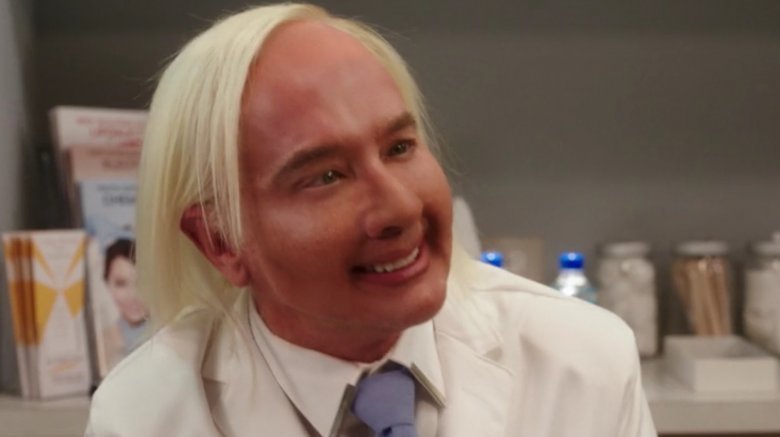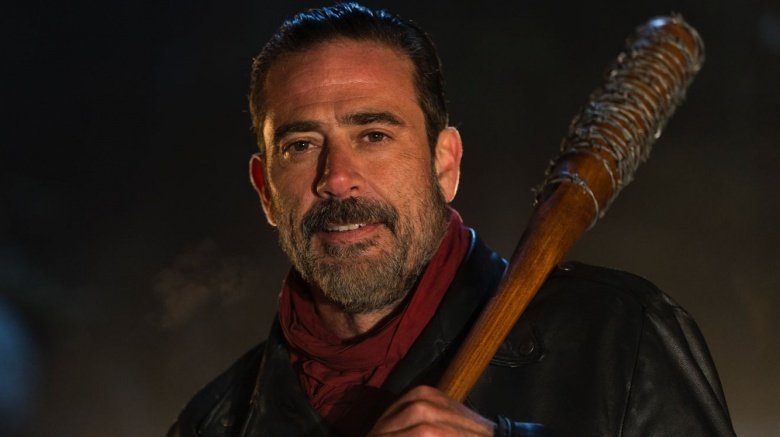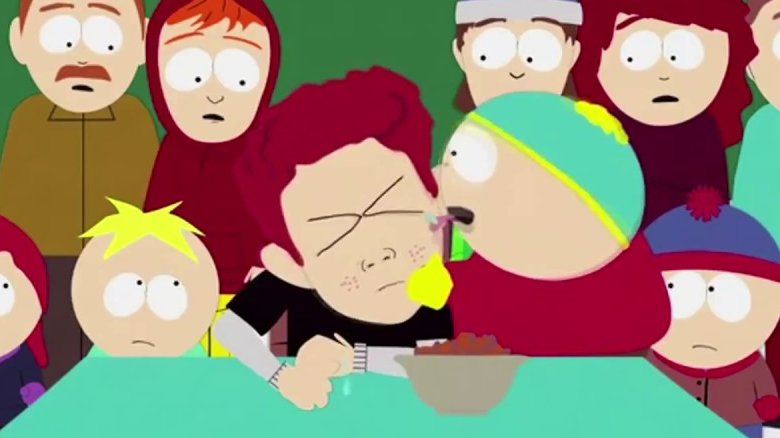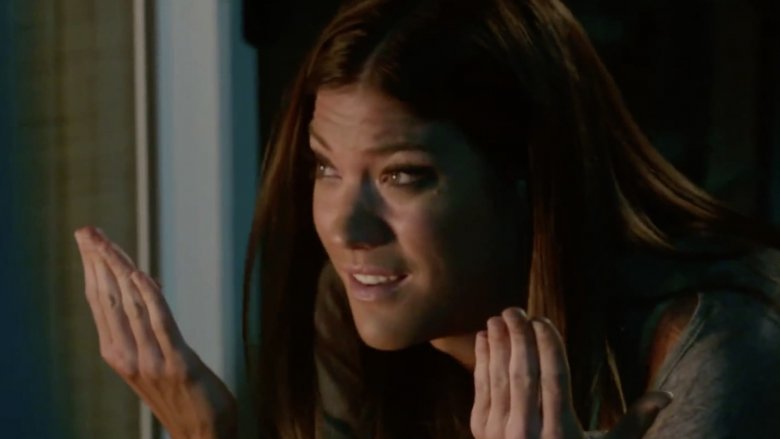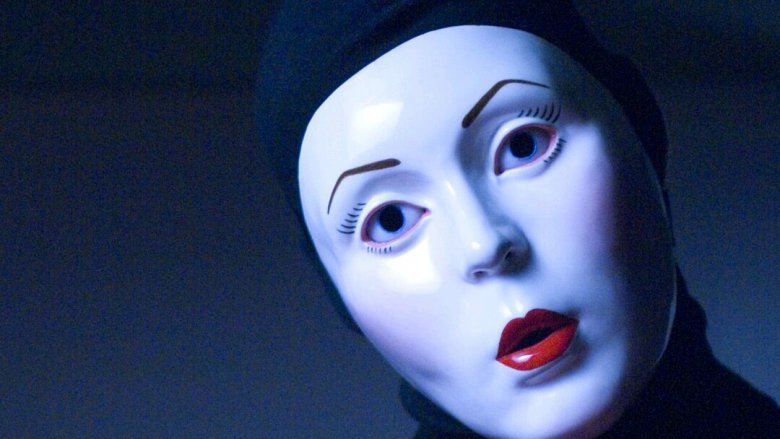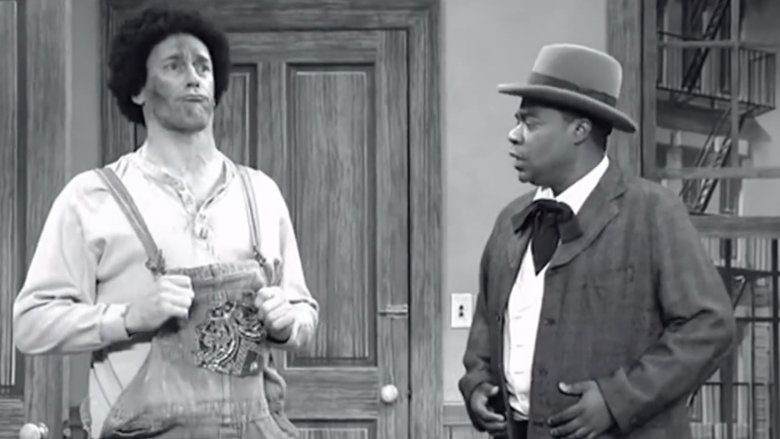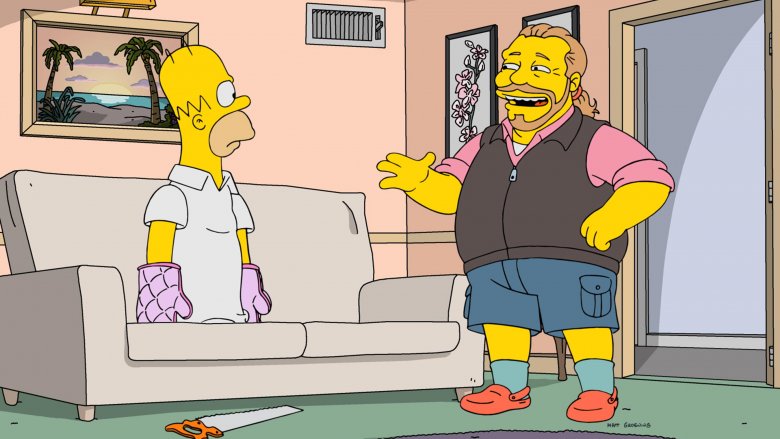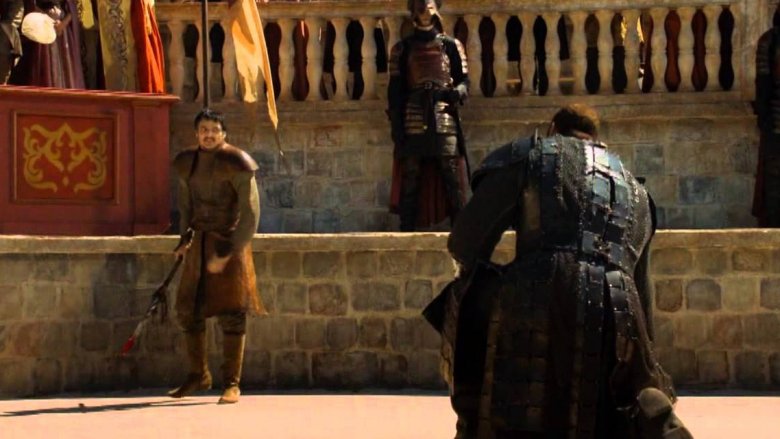Moments In TV That Took Things Way Too Far
Once upon a time — like, in the '80s — TV was a comforting, familiar salve at the end of the day. Each week, we'd tune in to our favorite shows expecting familiar, predictable adventures from familiar, predictable characters.
But now we're in the era of Peak TV. Over the last decade or so, television became high art, as good as or even better than movies. The format has attracted true artists who continually push the envelope — not only in terms of storytelling, but what networks will air, and what audiences can handle.
Naturally, that's a blurry line that can easily result in a show going too far, like when a character in a popular cartoon fed another character ground up chunk of his own parents, or when a comedic portrayal of a real-life person possibly contributed to his suicide. Yeah, it gets a bit heavy on this one.
Here are some times when shows might have pushed the envelope with a little too much creative force.
Unbreakable Kimmy Schmidt's unthinkable consequences
Counter to its relentlessly sunny title character (Ellie Kemper), Netflix's Unbreakable Kimmy Schmidt has an undercurrent of darkness. It is, after all, about one woman's journey to find herself after being locked in an underground bunker for more than a decade. It's also a show that's highly critical of New York's superficial and wealthy elite via the character Jacqueline (Jane Krakowski), a disgraced socialite trying to climb her way back.
In the 2015 episode "Kimmy Goes to the Doctor!" Jacqueline visits her top-shelf plastic surgeon, Dr. Sidney Grant (pronounced "franff"), as portrayed by Martin Short. In addition to the odd pronunciation of his name, Dr. Grant is a weird guy prone to weird behaviors, including the inability to control his face, what with all of the work he's had done to it. The average non-New Yorker may not have picked up on it, but New York gossip columnists quickly figured out that Dr. Grant was a dig against Dr. Frederick Brandt, a dermatologist to the stars. He also dealt with severe depression, and shortly after this episode of Kimmy Schmidt hit Netflix, Brandt took his own life.
Brandt's publicist Jacquie Tractenberg denied that the suicide had anything to do with a sitcom, but she did acknowledge that he'd been hurt by Short's portrayal. "The show didn't help. It was mean. He felt bullied. It was mean-spirited picking at the way he looked for no reason at all. But he suffered from depression before that."
The Walking Bait-And-Switch
Early in the sixth season of AMC's zomb-dram Walking Dead, fan favorite Glenn (Steven Yeun) was seemingly eaten by zombies. His name was even missing from the credits the next week...only for his true fate to be revealed a couple episodes later: rather than fall off of a trash receptacle into a horde of Walkers, he hid underneath it and escaped. Fans and critics felt trolled, because they were.
"In creating false suspense and undermining the life-or-death stakes it thrives on," wrote Melissa Leon of The Daily Beast, "The Walking Dead just lost at its own game." The show spent the rest of its sixth season building up to the introduction of the source comics' most notorious villain: Negan (Jeffrey Dean Morgan), leader of a cult-like community who keeps things in line by occasionally murdering someone with a barbed-wire-wrapped baseball bat he calls "Lucille." In the last episode of the season, viewers knew somebody was going to get brained—and in the comics, it was Glenn. But when the moment came, the visuals cut to black, leaving just violent, disgusting audio of Lucille doing her job.
Once again, the show trolled fans, not revealing until the start of the seventh season who had died (Glenn, as well as Abraham). Pretending to kill Glenn, then killing Glenn (and Abraham), and waiting for the reveal, was just too much fan manipulation—the show's ratings have significantly dropped since Negan arrived.
South Park finally offended everyone
Over the course of 20 years on the air, South Park has pretty much been about Eric Cartman doing terrible things. He is an unrepentant racist, sexist, narcissistic monster child who has done everything from faking a disability to enter the Special Olympics to trying to kill every redheaded kid on Earth to starting the "Crack Baby Athletic Association." But what he did to poor Scott Tenorman on a 2001 episode showed Cartman's true depths of depravity, while also giving a window into his shocking pettiness.
After the older kid repeatedly pranked him and cheated him out of a few bucks, Cartman tried to get his revenge through pranks, but failed...until he held a chili cook-off. In that chili: the bodies of Scott's dead parents, which Cartman snatched, ground up, and fed to Scott. When a horrified Scott started to cry, Cartman licked his tears. Den of Geek wrote that this episode " truly cements Cartman's evil and makes Damien from The Omen look friendly in comparison."
When Dexter decided to keep it in the family
How can a premium cable show about a serial killer possibly get darker? What's the one thing that even fans of a show about murder think is gross? Incest.
Toward the end of its run, Dexter had done about all it could do with its lead character, a Miami police forensics expert who also murdered bad guys. He'd evaded capture so many times it was getting ridiculous, especially since his true nature was rarely even suspected by those in his orbit, including his sister, Deb (Jennifer Carpenter), a talented police detective. So the show had to up the ante — Deb finally found out about Dexter's murder habit...right around the time she realized she had romantic feelings for him. (Technically, it's not totally weird because Dexter was adopted, but still — family is family.)
Crave called it the single worst episode of the long-running series. Showrunner Scott Buck defended the plot line to Entertainment Weekly, sniffing, "I find it kind of interesting that people are uneasy about Deb's love toward her brother. That on a show about serial killers, it's the idea of love that makes people more uncomfortable." Okay, Scott.
Nip/Tuck takes a dark turn
In its first two seasons, Ryan Murphy's salacious plastic surgery drama was a thoughtful if flashy satire: The point seemed to be that society's beauty norms were so crushing that it was absurd that people would submit to expensive, elaborate surgeries performed by narcissistic doctors all in pursuit of that beauty. In season three, however, the show veered head-on into hateful nihilism.
A mysterious psychopath and serial rapist named "The Carver" haunted the show's Miami setting, slicing up people's faces, seemingly targeting those who'd had plastic surgery from the show's central Troy/McNamara practice. Maureen Ryan of the Chicago Tribune called Nip/Tuck's third season "relentlessly dark and seemingly obsessed with making each and every character...as unlikable as possible." At various points, the Carver (later revealed to be one of the series' main characters) sexually assaulted Dr. Troy (Julian McMahon), then kidnapped his fiancée, Kimber (Kelly Carlson), from their wedding. She later turned up on the side of the road, horrifically mutilated with a "smile" etched into her face, all of her facial surgeries undone by the Carver without the use of anesthesia.
Just don't try blackface. Ever.
When 30 Rock went live for broadcasts in 2010 and 2012, it kept its usual reliance on "flashback" comedic sequences in place through creative methods. For example, because co-creator/star Tina Fey couldn't be in two scenes at the same time, she was played in a flashback sequence by Julia Louis-Dreyfus. The 2012 episode had a recurring bit: clips of an old, racist TV show from the '50s called Alfie 'n' Abner.
Regular cast member Tracy Morgan portrayed an actor playing Alfie, one of two African-American brothers...and non-African-American actor Jon Hamm played the guy playing Abner. And he did it all with broad African-American stereotypes indicative of 1950s television...and with a light coating of dirt on his mug that suggested blackface. The bit was supposed to mock and criticize how awfully non-whites were represented on TV in the past — specifically Amos n' Andy — and how the entertainment industry had a long, ugly history of using white actors to play African-American characters. But for many viewers, the send-up was just as offensive as the genuine article. Among the tweets that went out when the episode aired: "I believe Tina Fey is a racist morally repugnant socially insensitive culturally incompetent bigot I'm done" and "Blackface isn't funny."
What is it with cartoons and cannibalism?
The long-running cultural institution The Simpsons has aired more than two dozen three-part Halloween specials at this point. Usually mostly funny and only a little scary, "Treehouse of Horror" has even featured cannibalism a few times, such as when the Devil turned Homer's head into a doughnut and Homer couldn't help but nibble on himself because he's "so sweet and tasty," or when the Springfield Elementary cafeteria ground up ill-mannered children into lunch.
Neither of those, however, can compare to the "Treehouse of Horror XVIII" closer, "Mmm...Homer," called everything from one of the series' "most disturbing episodes" to "horrifying" and "chilled." After being left home alone, Homer accidentally cuts off one of his fingers and it plops onto a hot grill. Homer, being Homer, eats it, and finds himself to be quite delicious. Over the course of the next seven minutes or so, Homer systematically dismembers, cooks, and eats himself. At the end, what little is left of Homer gets cooked up by celebrity chef Mario Batali and served to hungry Springfieldians, including Bart, who eats a hunk of Homer's brain.
Simpsons fans found the whole thing gross and unnerving. One viewer tweeted "this was taking it to [sic] far and quite disgusting," while another called it "the most uncomfortable and funniest Treehouse of Horror segment in a long, long time."
And you thought The Red Wedding was bad...
In 2017, Game of Thrones guest star Ian McShane came under fire for spoiling the plot of the episode on which he appeared, but then responded to the outcry by remarking that HBO's award-winning fantasy series was "only t**s and dragons." True, but he left out the part about the extremely graphic and realistically rendered violence — this is a show in which people routinely get slaughtered in a variety of creative, horrific, and sickening ways.
The worst just might have occurred in the 2014 episode "The Mountain and the Viper," when the loyal and likable Oberyn Martell (Pedro Pascal) fell to Gregor Clegane (Hafþór Júlíus Björnsson), the fearsome behemoth warrior better known as the Mountain, when fighting on behalf of Tyron Lannister (Peter Dinklage) in his "trial by combat." While it wasn't all that unexpected that the Mountain won, the way he did was unforgettable: he held Oberyn's head in his hands, stuck his thumbs into the eye socket...and pushed. The head exploded, with blood and gore leaking everywhere, which was too much for even some regular Game of Thrones viewers. Fans sounded off on Twitter, remarking that the "disgusting scene" made them feel "queasy," and wondering if they'd "ever be able to get that image" out of their heads.
What goes better with kids cartoons than a fatal DUI wreck?
In the fine tradition of Muppet Babies, The Flintstone Kids, and Popeye and Son (yes, that's real) came the Steven Spielberg-produced Tiny Toon Adventures in 1990, offering yet another animated show about infantilized versions of old characters. Warner Bros. favorites like Bugs Bunny, Daffy Duck, and Porky Pig became adolescents named Buster Bunny, Plucky Duck, and Hamton J. Pig, and they all had wacky cartoon adventures. Episodes were almost always pure comedy...with an extremely notable exception.
The 1991 entry "Elephant Issues" was ostensibly a parody of the "Very Special Episodes" that kid-and-teen-oriented shows of the era aired once in a while — like when Jessie got hooked on caffeine pills on Saved by the Bell, or when Tom Hanks played alcoholic Uncle Ned on Family Ties. But for one of the three segments of "Elephant Issues," Tiny Toons got just as over-the-top as the thing it should have been mocking. "One Beer" found Buster, Plucky, and Hamton discovering a single beer. They split it three ways, which led to a quick and deep descent into alcoholism, ending when the trio stole a cop car, crashed, and died. Producers received so many complaints that the segment was pulled from circulation and didn't air for more than 20 years.

